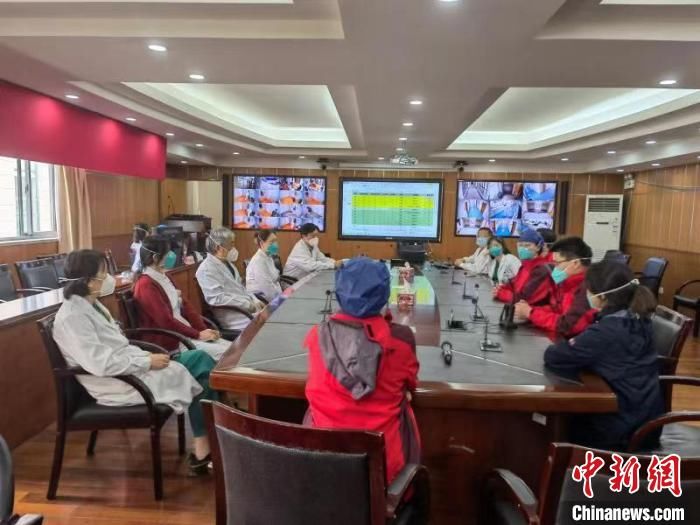China News Service, Shanghai, April 27 (Chen Jing, Xu Ying) In order to improve emergency response capabilities, the northern campus of the Ninth People’s Hospital affiliated to Shanghai Jiaotong University School of Medicine (Shanghai Ninth Hospital) was rebuilt and converted into a designated hospital for new crown treatment. The reporter learned on the 27th that the Hubei medical team who is supporting the hospital and Professor Xiong Weining, director of the Department of Respiratory and Critical Care Medicine of the Shanghai No. 9 Hospital, jointly manage the ICU beds. The average age of the patients admitted is over 75 years old, including many patients over 90 years old.
Fu Xinqiao, leader of the medical team in Shanghai and deputy director of the Outpatient Office of Union Hospital Affiliated to Tongji Medical College of Huazhong University of Science and Technology, said: “Let’s study and formulate various rules and regulations and procedures for medical treatment, nursing, hospital feeling, etc. On the basis of ensuring medical safety, we will rapidly promote the development of medical treatment.”
Wu Hao, president of the Shanghai Ninth Hospital, told reporters on the same day that the designated hospital for the new crown treatment of the Shanghai Ninth Hospital has 843 doctors and nurses in the hospital; The Shanghai medical team is led by Union Hospital Affiliated to Tongji Medical College of Huazhong University of Science and Technology, with 67 members from 5 hospitals including Hubei Provincial People’s Hospital, Wuhan First Hospital, Wuhan Fourth Hospital, and Wuhan Asian Heart Hospital. They have all participated in epidemic prevention and control work and have rich experience. From April 18 to April 26, a total of 874 patients were admitted to the designated hospitals for the treatment of COVID-19 in Shanghai Ninth Hospital. The number of patients aged 70 and over accounted for more than 60%. Among all the patients, 267 had underlying severe diseases. With the joint efforts of medical and nursing staff in Shanghai and Hubei, 127 people have recovered and returned home, and the average hospital stay for discharged patients is 5.49 days.

Shanghai is rapidly entering an aging population. In 2021, the average life expectancy will reach 84.11 years. In 2020, the population over 60 years old will account for 36.1% of the registered population. Most of the elderly are accompanied by one or more chronic diseases. After infection with the Omicron variant, the symptoms caused by the virus itself may not be serious, but the symptoms of multiple chronic diseases will appear at the same time, which requires strong medical support. It is reported that the treatment of critically ill patients is the current challenge facing Shanghai. Wang Xingpeng, director of the Shanghai Shenkang Hospital Development Center, said that Shanghai adheres to the principle of giving equal attention to the prevention of mild to severe cases and the treatment of severe cases, the treatment of new crowns and the treatment of basic diseases, and the treatment of traditional Chinese and Western medicine. More than 360 critical care medical experts in Shanghai, plus experts supported by other provinces and cities, have jointly established 9 critical care teams, stationed in 8 city-level designated hospitals, and fully treated critically ill patients.
Deputy head of the medical treatment team of Minhang Gymnasium Designated Hospital, Tu Guowei, an expert in the Department of Critical Care Medicine of Zhongshan Hospital Affiliated to Fudan University, said that for patients with underlying diseases, especially those with a variety of underlying diseases and immunocompromised people, People who have not been vaccinated have a higher risk of becoming severe and critically ill. In the designated medical institution, Baoshan District of Huashan Hospital Affiliated to Fudan University, Professor Qin Lunxiu, Executive Vice President of Baoshan District and President of the designated hospital, said that one-third of the new coronary pneumonia patients admitted to the hospital are over 70 years old The elderly, there are twenty or thirty elderly people between the ages of 90 and 100. Almost all of them suffer from a variety of underlying diseases, some are cardiovascular and cerebrovascular diseases, and some are uremia requiring dialysis.
In the ICU (Intensive Intensive Care Unit) ward of Renji Hospital Affiliated to Shanghai Jiaotong University School of Medicine (designated hospital) (hereinafter referred to as Renji Nanyuan), the critically ill patients here are elderly The elderly are mainly the elderly, and the oldest among the rescued elderly is 97 years old. Every afternoon at Renjinan Hospital, doctors in the designated hospitals and experts from the parent hospital will discuss the diagnosis and treatment plans for critically ill patients in the hospital one by one, and accurately formulate “one person, one policy”. (End)